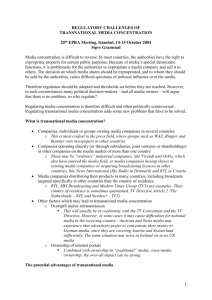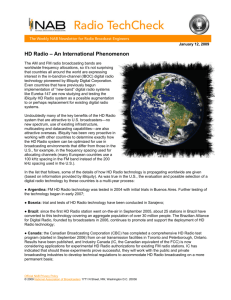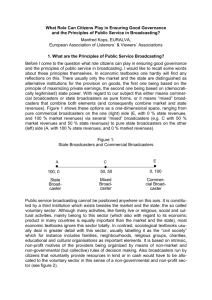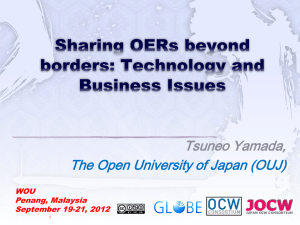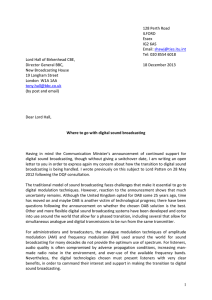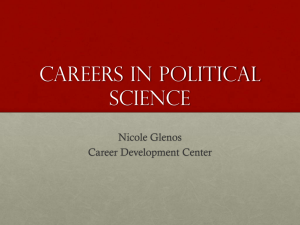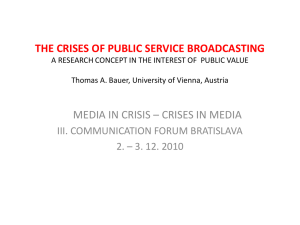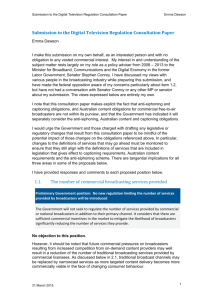UNI MEI Manifesto on Independent and High
advertisement
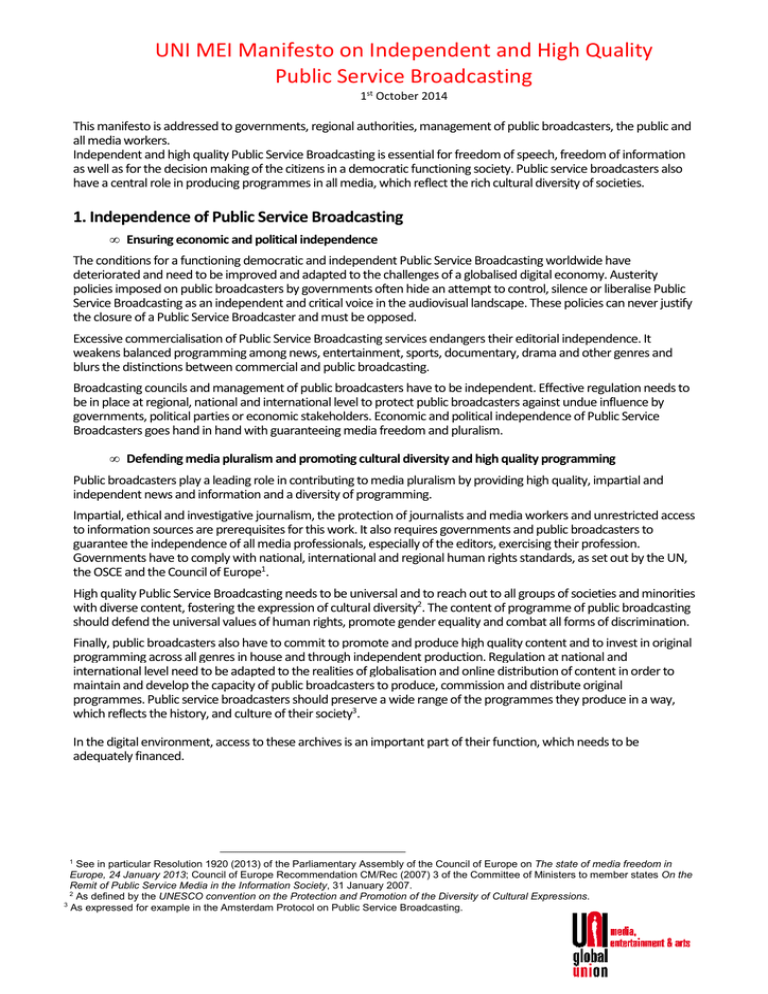
UNI MEI Manifesto on Independent and High Quality Public Service Broadcasting 1st October 2014 This manifesto is addressed to governments, regional authorities, management of public broadcasters, the public and all media workers. Independent and high quality Public Service Broadcasting is essential for freedom of speech, freedom of information as well as for the decision making of the citizens in a democratic functioning society. Public service broadcasters also have a central role in producing programmes in all media, which reflect the rich cultural diversity of societies. 1. Independence of Public Service Broadcasting • Ensuring economic and political independence The conditions for a functioning democratic and independent Public Service Broadcasting worldwide have deteriorated and need to be improved and adapted to the challenges of a globalised digital economy. Austerity policies imposed on public broadcasters by governments often hide an attempt to control, silence or liberalise Public Service Broadcasting as an independent and critical voice in the audiovisual landscape. These policies can never justify the closure of a Public Service Broadcaster and must be opposed. Excessive commercialisation of Public Service Broadcasting services endangers their editorial independence. It weakens balanced programming among news, entertainment, sports, documentary, drama and other genres and blurs the distinctions between commercial and public broadcasting. Broadcasting councils and management of public broadcasters have to be independent. Effective regulation needs to be in place at regional, national and international level to protect public broadcasters against undue influence by governments, political parties or economic stakeholders. Economic and political independence of Public Service Broadcasters goes hand in hand with guaranteeing media freedom and pluralism. • Defending media pluralism and promoting cultural diversity and high quality programming Public broadcasters play a leading role in contributing to media pluralism by providing high quality, impartial and independent news and information and a diversity of programming. Impartial, ethical and investigative journalism, the protection of journalists and media workers and unrestricted access to information sources are prerequisites for this work. It also requires governments and public broadcasters to guarantee the independence of all media professionals, especially of the editors, exercising their profession. Governments have to comply with national, international and regional human rights standards, as set out by the UN, the OSCE and the Council of Europe1. High quality Public Service Broadcasting needs to be universal and to reach out to all groups of societies and minorities with diverse content, fostering the expression of cultural diversity2. The content of programme of public broadcasting should defend the universal values of human rights, promote gender equality and combat all forms of discrimination. Finally, public broadcasters also have to commit to promote and produce high quality content and to invest in original programming across all genres in house and through independent production. Regulation at national and international level need to be adapted to the realities of globalisation and online distribution of content in order to maintain and develop the capacity of public broadcasters to produce, commission and distribute original programmes. Public service broadcasters should preserve a wide range of the programmes they produce in a way, which reflects the history, and culture of their society3. In the digital environment, access to these archives is an important part of their function, which needs to be adequately financed. 1 See in particular Resolution 1920 (2013) of the Parliamentary Assembly of the Council of Europe on The state of media freedom in Europe, 24 January 2013; Council of Europe Recommendation CM/Rec (2007) 3 of the Committee of Ministers to member states On the Remit of Public Service Media in the Information Society, 31 January 2007. 2 As defined by the UNESCO convention on the Protection and Promotion of the Diversity of Cultural Expressions. 3 As expressed for example in the Amsterdam Protocol on Public Service Broadcasting. UNI MEI Manifesto on Independent and High Quality Public Service Broadcasting 1st October 2014 • Guaranteeing accountable PSB governance and management Governance structures of public broadcasters have to be held accountable to citizens and staff about key decisions affecting the independence of Public Service Broadcasting. This includes decisions on restructuring and outsourcing of employees of public broadcasters, as well as major decisions affecting the political and economic independence of Public Service Broadcasting. Media independence and media ownership need to be transparent and to be monitored at regular intervals. Accountability concerns a wide range of issues and goes beyond financial management and governance. It also includes the commitment of public broadcasters to ensure programmes, which are respectful of diversity and equality, equal access, citizens’ fundamental rights, freedom of expression and protection of content. 2. Financing sustainable Public Service Broadcasting in the global digital economy • Sustainable and predictable funding Public Service Broadcasters need to receive appropriate and sustainable funding to allow them to carry out their public service mission with a high degree of professionalism and independence. Regardless of the different democratic funding models for Public Service Broadcasting, which exist worldwide, the financing of Public Service Broadcasting needs to safeguard the ability of public broadcasters to adapt and develop programming and services to technological, economic and structural changes in the global digital economy. 3. Quality employment for quality Public Service Broadcasting • High quality jobs A sustainable Public Service Broadcasting with high quality services depends on a skilful workforce benefitting from good working conditions. This implies fair remuneration for creators and other media workers, adequate work-life balance arrangements, respect of health and safety standards, and continuous investment in skills of all workers. Good working conditions are key for sustaining a highly skilled workforce and the ability of public broadcasters to produce high quality programmes. Undeclared work, low pay jobs, precarious employment and profit-oriented management are detrimental to the development of a skilled workforce and high quality Public Service Broadcasting. Decisions governing public service broadcasters must have the active participation of workers and, as a public service, should be open to the views and proposals of citizens. • Investment into skills and access to lifelong learning schemes In times of huge and rapid technological changes, Public Service Broadcasting workers must be given the means to constantly improve their skills and capacities, regardless of the workers’ employment status and work arrangement. Investment in workers’ skills and competences is a precondition for high quality Public Service Broadcasting and creates the conditions for successful innovation in Public Service Broadcasting services. All Public Service Broadcasting workers need to benefit from a right to life-long learning and paid training leave. • Effective social dialogue Quality employment also requires a firm commitment from governments and public broadcasters’ management to effective social dialogue and collective bargaining with trade unions. Social dialogue must be open to all types of workers, including those working under atypical forms of employment, such as own account workers, freelance and part-time workers. Social dialogue plays a significant role in structuring the labour market and allows for adaptations to the specific needs of management and labour across the sector and at enterprise level.
